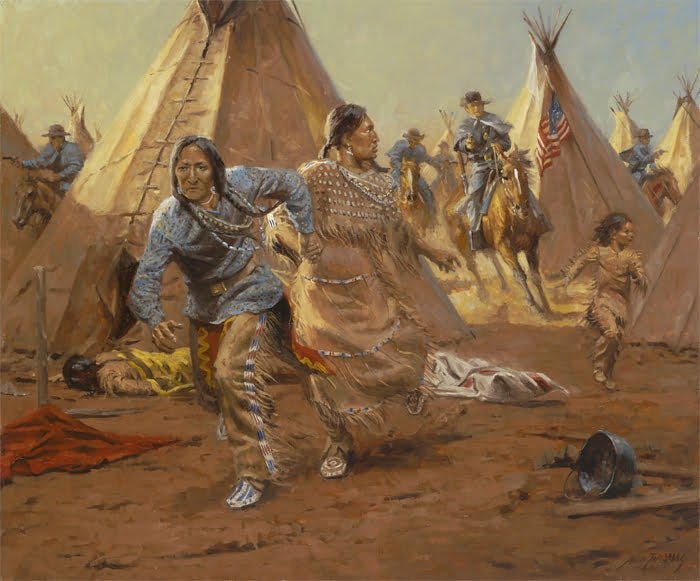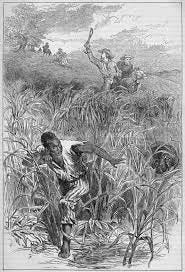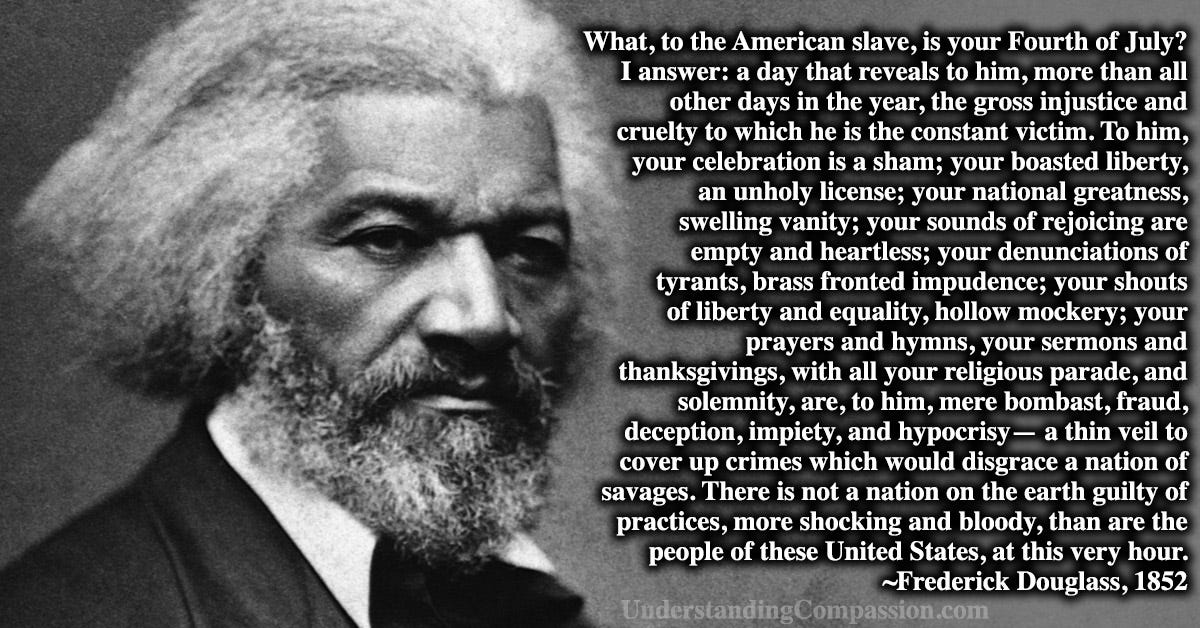"For Revolting Barbarity and Shameless Hypocrisy, America Reigns Without a Rival"
July 5th Reflections on the Declaration of Independence and American History
The lion’s share of the July 4 1776 United States’ founding document the Declaration of Independence (DOI) is a list of a bill of complaints against the British King.
Let’s look at three of the complaints:
+1. He [is]…raising the conditions of new Appropriations of Lands.”
Translation: the British monarchy was putting territorial limits on the North American colonists-turned imperial national independence fighters’ ability (a) to further violently dispossess and displace Indigenous North American people and (b) to distribute their population of Black chattel slaves over a broader range of territory to alleviate the prospects for Caribbean style slave rebellions.
“New appropriations of lands” refers to the 1763 proclamation line and the 1768 boundary line treaty, which set limits on Western expansion by the colonists.
An excellent account of the American “revolution” (the US national break-off from England) as a counter-revolutionary effort to prevent North American slave uprisings is The Counter-Revolution of 1776: Slave Resistance and the Origins of the United States of America (New York University Press, 2014). I reviewed Horne’s narrative-flipping study here.
+2. “He has plundered our seas, ravaged our Coasts, burnt our towns, and destroyed the lives of our people.”
From the fall of 1775 through early 1776, Lord Dunmore, the last royal governor of the British colony of Virginia, assembled army and naval forces and attacked numerous towns on the Virginia coast, and along the colony’s inland rivers.
So the British were doing to some colonists precisely what the colonists and their former home country felt entitled by race and God to do to the original inhabitants of coastal North America. The United States’ first and heralded president, the “father of the country,” George Washington was a determined killer of Native Americans known to the Iroquois as Conoctocaurious, meaning “Town Taker,” “Burner of Towns,” “Village Destroyer,” and “Town Destroyer.” In 1779, during the American War for Independence, Washington ordered and organized the Sullivan Campaign, which carried out the genocidal destruction of 40 Iroquois villages in New York. [1]
+3. “He has excited domestic insurrections amongst us, and has endeavoured to bring on the inhabitants of our frontiers, the merciless Indian Savages, whose known rule of warfare, is an undistinguished destruction of all ages, sexes and conditions.”
A useful and honest translation of this passage of the DOI is provided by the United States National Parks Service (for real):
‘While this is often interpreted as one grievance it is actually two separate grievances combined into one. The “domestic insurrections” brought on by the British refers primarily to Lord Dunmore’s proclamation that any slaves that ran away from their rebel masters to join him to fight the rebels would be granted their freedom. A significant part of his force that had attacked the Virginia coast was composed of runaway slaves. The “Founding Fathers” were painfully aware of how hypocritical they were being in stating that “all men are created equal” while maintaining slavery in the colonies, so the reference is very veiled, but the threat of large-scale slave revolts was a great fear for many in the colonies. The use of various Indian allies by the British all throughout the war was looked upon with as much horror by many members of Parliament as it was by the colonists.’
In other words, here the DOI’s authors (Thomas Jefferson and John Adams) are complaining about how the British were offering freedom to the colonists’ Black chattel slaves (what an offense against liberty!) and allying with some of the Indigenous people the colonists (and the British crown) had been genocidally cleansing from the North American eastern seaboard and further West.
As for “undistinguished destruction of all ages, sexes and conditions,” that was projection on steroids. Genocidal elimination was the colonists’ thing, not the Native Americans’ practice. Here is a passage from the sixth chapter, titled “America Was Never Great” in my 2021 book This Happened Here: Amerikaners, Neoliberals and the Trumping of America:
‘The use of messianic Christianity to justify murdering and maiming people of color en-masse goes back to the original British invasion of what would be called New England. The U.S. Declaration of Independence’s description of North America’s original inhabitants as “merciless Indian savages” anticipated Orwell by projecting onto Native Americans the genocidal practices that white “settlers” exhibited from day one. Consider the celebrated progressive historian Eric Foner’s textbook description of the grisly and religiously infused Mystic River Massacre of 1637:
“A force of Connecticut and Massachusetts soldiers, augmented by Narraganset allies, surrounded the main Pequot fortified village at Mystic and set it ablaze, killing those who tried to escape. Over 500 men, women, and children lost their lives in the massacre. By the end of the war [of New England settlers on the once powerful Pequot tribe], most of the Pequots had been exterminated or sold into Caribbean slavery. The treat that restored peace decreed that their name should be wiped from the historical record…The colonists’ ferocity shocked their Indian allies, who considered European military practices barbaric. A few Puritans agreed. “It was a fearful sight to see them frying in the fire,” the Pilgrim leaders William Bradford wrote of the raid on Mystic. But to most Puritans, including Bradford, the defeat of a “barbarous nation” by “the sword of the Lord” offered further proof that they were on a sacred mission and that Indians were unworthy of sharing New England with the visible saints of the church.” (Eric Foner, Give Me Liberty! An American History, v.1 [New York: W.W. Norton & Company, 2013], p, 73.)
The Puritans wept with joy and thanked “God” for helping them flame-broil Indian women and children who stood on ground they would turn into a heavenly “City on the Hill.” A glorious moment in the unfolding of the great democratic “Saxon” ideal that American historians before Frederick Jackson Turner (chiefly George Bancroft) considered to be the distinctive genius of the United States and its British-colonist forbearers!
After a cruel campaign of ethnic cleansing (at the conclusion of “King Phillips’ War”) in which the white (un-) settlers pushed most of the last Indians they had not killed out of New England in the mid-1670s, “the image of Indians as bloodthirsty savages,” Foner writes, “became firmly entrenched in the New England mind.” (Foner, Give Me Liberty, 97.)’
What on Earth would have been wrong with “exciting domestic insurrection” against the early capitalist-imperialist US republic, a rapacious and genocidal slave state based on the elimination of the nation’s first people and the creation of a vast racist slave-based empire of torture and cotton out to the Mississippi River and beyond?!
US national independence “brought about the reassertion of slaveowner control over the enslaved black population in the new republic” (Horne, The Counter-Revolution of 1776, p. 244). The North American slave system tightened and expanded in subsequent years. The color line between white and black was drawn with harsher lines than ever before in the “land of liberty.” Gerald Horne reflected on immediate and long-term consequences that do not jibe very well (to say the least) with the dominant national sense (shared even by many left historians) of the American Revolution as a democratic, forward-leaning development:
‘there is a disjuncture between the supposed progressive and avant-guard import of 1776 and the worsening of conditions of Africans and the indigenous that followed upon the triumph of the rebels. Moreover, despite the alleged revolutionary and progressive impulse of 1776, the victors went on from there to crush indigenous politics, then moved overseas to do something similar in Hawaii, Cuba, and the Philippines, then unleashed its counter-revolutionary force in 20th-century Guatemala, Vietnam, Laos, Cambodia, Indonesia, Angola, South Africa, Iran, Grenada, Nicaragua and other tortured sites too numerous to mention’ (Horne, The Counter-Revolution of 1776, p. 248).
The white North American settlers’ counter-revolution was a great slavery success – at least until the Civil War, when another white secession and military necessity compelled Abraham Lincoln to follow in Lord Dunmore’s footsteps by liberating and arming black slaves. By 1836, the historian Edward Baptist calculates, nearly half the nation’s economy activity derived directly and indirectly from the Black slaves who toiled on the nation’s southern cotton frontier. Sectional differences aside, Baptist shows in his prize-winning book The Half Has Never Been Told: Slavery and the Rise of American Capitalism that “the commodification and suffering and forced labor of African Americans is what made the United States powerful and rich” decades before the Civil War. Capitalist cotton slavery was how United States seized control of the lucrative the world market for cotton, the critical raw material for the Industrial Revolution, emerging thereby as a rich and influential nation in the world capitalist system by the second third of the 19th century.
The returns were wrung through soul-numbing exploitation overlaid with savage racist torture. Chronicling the astonishingly horrifying violence and terror inflicted on millions of Black Americans who suffered in bondage over the eight decades between US national independence (1783) and the US Civil War (1861-1865), Baptist documents how the southern slave engine of American capitalist accumulation murdered Blacks in huge numbers and “stole everything” from surviving slaves through “the massive and cruel engineering required to rip a million people from their homes, brutally drive them to new, disease-ridden places, and make them live in terror and hunger as they continually built and rebuilt a commodity-generating empire…” Over a generation, The Half Has Never Been Told shows, the infant US South grew from a thin coastal belt of burnt-out tobacco plantations into a giant continental Empire of Cotton. This remarkable expansion was rooted in regular and ferocious white violence. The brutality and bloodshed included mass-murderous Indian Removal (cotton slavery required constant westward territorial extension), forced slave migrations, the endemic fracturing of slave families, and he ubiquitous and systematic torture of Black slaves. As Baptist observes:
‘In the sources that document the expansion of cotton production, you can find at one point or another almost every product sold in New Orleans stores converted into an instrument of torture [used on slaves]: carpenters’ tools, chains, cotton presses, hackles, handsaws, hoe handles, irons for branding livestock, nails, pokers, smoothing irons, singletrees, steelyards, tongs. Every modern method of torture was used at one time or another: sexual humiliation, mutilation, electric shocks, solitary confinement in ‘stress positions,’ burning, even waterboarding…descriptions of runaways posted by enslavers were festooned with descriptions of scars, burns, mutilations, brands, and wounds.’ (Baptist, The Half Has Never Been Told, p. 141)
George Washington, the general who led the US War for Independence and served as the imperial infant republic’s first president, owned more than 300 Black slaves. He expected the Black chattel humans on his 1790s Mount Vernon estate to work from before sunrise to after sunset six days a week. At the end of the U.S. “revolutionary” war, he demanded that the British return all escaped slaves in their possession to their “rightful owners.”[2]
DOI co-author Thomas Jefferson’s sadistic treatment of his Black slaves is detailed at length in Henry Wiencek’s brilliant, chilling, and carefully researched study Master of the Mountain: Thomas Jefferson and His Slaves (2013). Wiencek finds that:
‘ Jefferson is a man of business and public affairs who makes a success of his debt-ridden plantation thanks to what he calls the "silent profit" gained from his slaves―and thanks to the skewed morals of the political and social world that he and thousands of others readily inhabited. It is not a pretty story. Slave boys are whipped to make them work in the nail factory at Monticello that pays Jefferson's grocery bills. Slaves are bought, sold, given as gifts, and used as collateral for the loan that pays for Monticello's construction―while Jefferson composes theories that obscure the dynamics of what he himself called "the execrable commerce."'
***********************************
“What, to the American slave, is your 4th of July?” the great abolitionist Frederick Douglass asked on July 5, 1852. “A day,” Douglass answered, “that reveals to him, more than all other days in the year, the gross injustice and cruelty to which he is the constant victim.” Further:
‘To him, your celebration is a sham; your boasted liberty, an unholy license; your national greatness, swelling vanity; your sounds of rejoicing are empty and heartless; your denunciations of tyrants, brass fronted impudence; your shouts of liberty and equality, hollow mockery; your prayers and hymns, your sermons and thanksgivings, with all your religious parade, and solemnity, are, to him, mere bombast, fraud, deception, impiety, and hypocrisy — a thin veil to cover up crimes which would disgrace a nation of savages. There is not a nation on the earth guilty of practices, more shocking and bloody, than are the people of these United States, at this very hour…Go where you may, search where you will, roam through all the monarchies and despotisms of the old world, travel through South America, search out every abuse, and when you have found the last, lay your facts by the side of the everyday practices of this nation, and you will say with me, that, for revolting barbarity and shameless hypocrisy, America reigns without a rival.’
Endnotes
[1] Peter Linebaugh, Stop, Thief!: The Commons, Enclosures, and Resistance (PM Press, 2014); Max Mintz, Seeds of Empire: The American Revolutionary Conquest of the Iroquois (New York: New York University Press, 1999); Johanna Cornblatt, “’Town Destroyer’ vs. the Iroquois,” U.S. News, 27 June, 2008, https://www.usnews.com/news/national/articles/2008/06/27/town-destroyer-versus-the-iroquois-indians; Brendan Maslauskas Dunn. “The Counter-revolution of 1776, the Genocide of 1779 and the ‘Village Destroyer’ Washington,” Black Rose, July 4, 2019, https://blackrosefed.org/the-counter-revolution-of-1776-the-genocide-of-1777-and-the-village-destroyer-washington/
[2] Sudie Hoffman, “Time to Tell the Truth About Slavery at Mount Vernon,” Zinn Education Project, February 15, 2015, https://www.zinnedproject.org/news/mount-vernon-tour/; “Slavery at Mount Vernon,” George Washington’s Mount Vernon, n.d., https://www.mountvernon.org/george-washington/slavery/slavery-at-mount-vernon/




The Sioux rebelled against the massacres and theft of their land in 1862 the US Army put down easily. President Lincoln approved the mass hanging of 38 Sioux who took part in the rebellion.
https://www.usdakotawar.org/history/aftermath/trials-hanging
What the United States will be remembered for in 500 or one thousand years -- should humanity last that long -- will be its ruling classes' ability to con (as in a confidence game) the working class into thinking that what was good for the 1% capitalists and financiers was good for the nation as a whole.
It is no wonder Americans grow increasingly angry and frustrated; they have been conned to buy into a system that takes more and more from them (their work, their labor, their productivity) every year while giving less and less back. (In lower wages relative to inflation, fewer benefits. etc.) Marx and Engels saw all of this in 1848 when they understood that capital would "immiserate" the working class. Of course most Americans don't even know what the working class is having no class consciousness.
I've tried to leave the country but, believe me, like the poor souls trying to sneak across the southern border, nobody wants poor Americans. The American capital class loves desperate illiegal aliens. They work for low wages, can't unionize and can't complain or they'll be deported. Back to the countries (like Guatemala) that American capitalist companies (United Fruit now Chiquita Banana [little girl in Spanish] decimated, expropriating the campisinos' land for plantations).
One can't escape the depredations and ravages of capitalism. And most Americans don't even know this about the economic system they are trapped in and enslaved to. Instead they take out their frustration and anger on their equally downtrodden neighbors. Just last Sunday a small store owner was shot and killed as he was closing his store in a robbery just down the block from my residence. May he rest in peace.
And may we someday, somehow, someway, find a better economic system than this. One that immiserated the masses so a few greedy b*stards can get obscenely rich. With money that they couldn't spend in a thousand life times while the poor experience their food stamps running out a week before the end of the month and wonder what they'll do to feed their kids until the next EBT allotment comes in on the first of the new month.